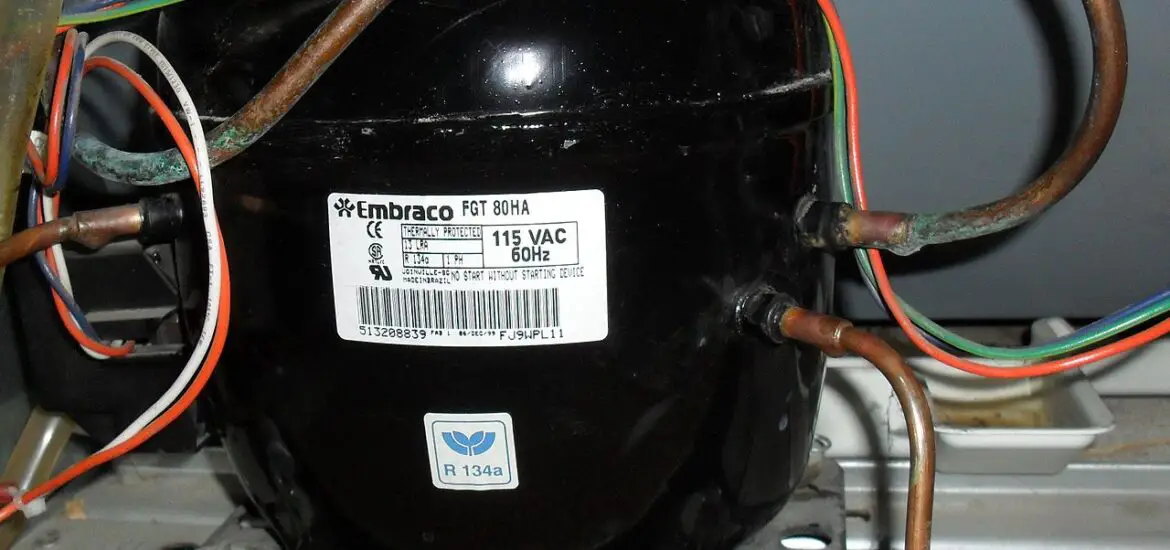Refrigerator compressor specifications, eh? Why the fuss about them? Well, they’re the nuts and bolts of your fridge’s cooling system. A better understanding of these specs can help you choose the right fridge or maintain your existing one more efficiently.

Table of Contents
Understanding Refrigerator Compressor
Have you ever thought about what makes your fridge stay cool? Spoiler alert: it’s the compressor. But what is a compressor, exactly?
What is a Refrigerator Compressor?
Picture this. Your refrigerator compressor is like the heart of your fridge. It pumps refrigerant throughout the system, which essentially ‘cools’ the interior. It’s like the beating heart of your fridge’s cooling cycle.
Why Compressor Specifications Matter
You wouldn’t buy a car without knowing its specs, right? The same goes for your fridge compressor. These specs have a significant impact on the performance and efficiency of your refrigerator. A fridge is not just a big box, you know!
Key Refrigerator Compressor Specifications
Let’s break down some of the critical specs you should be aware of when dealing with refrigerator compressors.
Compressor Type
Did you know there are different types of compressors used in refrigerators?
Reciprocating Compressors
Think of reciprocating compressors as little powerhouses. They’re the most common type found in household refrigerators and can handle a wide range of conditions.
Rotary Compressors
Ever heard of rotary compressors? They’re a different beast, known for their smooth operation and high efficiency.
Scroll Compressors
Last but not least, we have scroll compressors. These fellows are relatively new on the scene and are prized for their high efficiency and quiet operation.
Cooling Capacity
Okay, picture this: it’s a sweltering hot day, and you’re craving a cold drink. You reach for the fridge, but your drink’s lukewarm. Disappointing, right? That’s where cooling capacity comes in. It refers to the amount of heat your refrigerator’s compressor can remove from the fridge’s interior in a specific timeframe.
A higher cooling capacity means your fridge gets cold faster and stays that way, even in the face of frequent door openings or a full load of groceries.
Energy Efficiency
How about saving some money on your electricity bill? Energy efficiency, often expressed as an EER (Energy Efficiency Ratio), is a critical refrigerator compressor spec.
The higher the EER, the more efficient your fridge is. It’s like getting more cooling bang for your electricity buck. So, yes, an energy-efficient fridge might cost a bit more upfront, but it’ll save you some serious dough in the long run.
Compressor Size and Weight
Now, you might be thinking, “Size and weight? Seriously?” But hang on a sec, these specs do matter. A smaller, lighter compressor typically makes less noise, takes up less space, and can help improve your fridge’s overall energy efficiency. Remember, it’s not just about how big your fridge is on the outside; it’s what’s inside that counts, right?
Check out these other related articles…
Refrigerator Compressor Sound Blanket: A Detailed Guide
Refrigeration Compressor Oil: Your Ultimate Guide
Refrigerator Compressor Fire: Everything You Need to Know
Ice on Refrigerator Compressor Line: Causes & Solutions
Compressor Efficiency Test: Your Essential Guide
Interpreting Refrigerator Compressor Specifications
Ever looked at a spec sheet and felt like you were reading ancient hieroglyphics? Don’t sweat it. We’re here to help you crack the code. Here’s how to interpret refrigerator compressor specs.
Decoding Compressor Labels
A refrigerator compressor label can look pretty intimidating at first glance, right? All those cryptic codes and numbers. But, here’s the thing: each part of the label tells you something crucial about the compressor’s performance, type, and other specs.
For instance, there’s usually a model number that may indicate the series and cooling capacity. Then you’ve got the refrigerant type, showing what kind of refrigerant the compressor uses. Voltage and phase information represent the electricity requirements. It’s not that scary when you break it down, is it? Oh, and don’t forget about certification marks—they show that the compressor meets specific safety and performance standards.
Comparing Compressor Specifications
Okay, say you’re shopping around for a new fridge. You’ve got your options lined up, and now it’s time to compare the compressor specs. Here’s how to do it.
First, look at the compressor type—does the fridge use a reciprocating, rotary, or scroll compressor? Each has its pros and cons. Next, check out the cooling capacity—higher capacity usually means better cooling, but also higher energy usage. Then there’s the energy efficiency rating—the higher, the better. Size and weight may also come into play, especially if you’re dealing with space constraints or noise concerns.
Oh, and don’t forget to check the refrigerant type; some refrigerants are more eco-friendly than others. Just remember, you’re not just comparing numbers here. You’re figuring out which fridge offers the best blend of performance, efficiency, and value for your unique needs. You got this!
Common Refrigerator Compressor Specification Standards
Do you ever wonder who decides what “energy efficient” or “high capacity” really means? Well, wonder no more! Meet the big players of refrigerator compressor spec standards.
The International Electrotechnical Commission (IEC) Standards
The IEC, for those not in the know, is like the United Nations of electrical and electronic tech standards. They set the benchmarks for a wide range of technologies, including our good old fridge compressors.
The American Society of Heating, Refrigerating and Air-Conditioning Engineers (ASHRAE) Standards
Another heavy hitter is the ASHRAE. They’re all about advancing technology and standardizing things in the heating, refrigeration, and air conditioning world. ASHRAE standards play a significant role in ensuring the efficiency and performance of your refrigerator compressor.